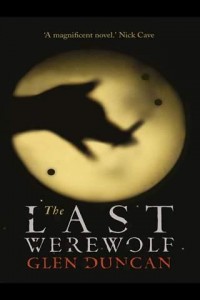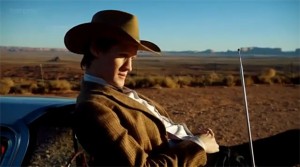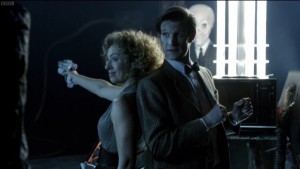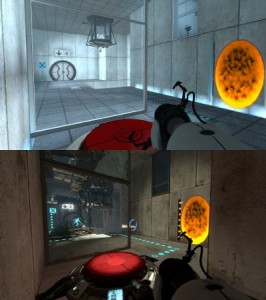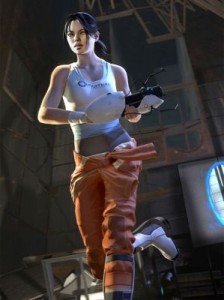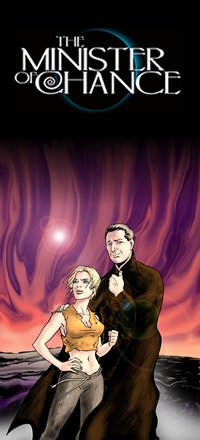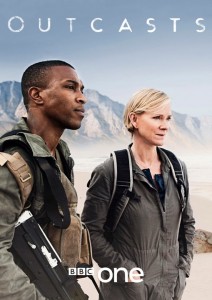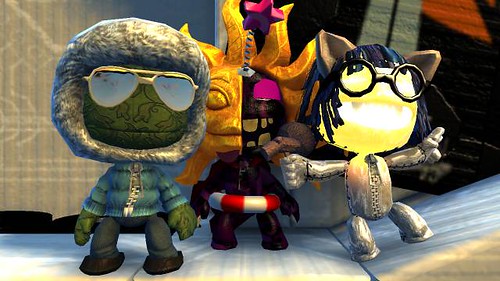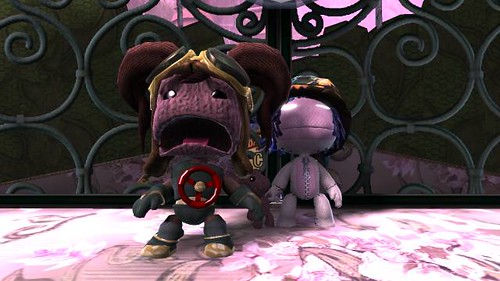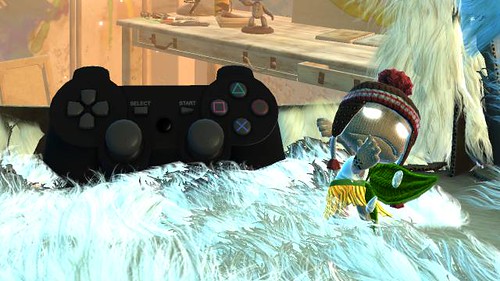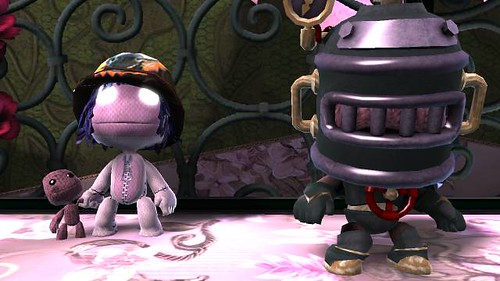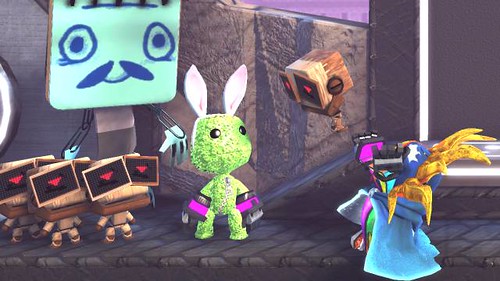Reviews
Sam reviews: The Last Werewolf
by ravenbait on Nov.05, 2011, under books
![]() It was with a mix of sympathy and amusement that I read this article on iO9 responding to Glen Duncan’s piece on Colson Whitehead’s Zone One in the New York Times magazine. On the one hand we have the opening paragraph, which is clearly a rather unwarranted set of clichés and prejudicial presumptions:
It was with a mix of sympathy and amusement that I read this article on iO9 responding to Glen Duncan’s piece on Colson Whitehead’s Zone One in the New York Times magazine. On the one hand we have the opening paragraph, which is clearly a rather unwarranted set of clichés and prejudicial presumptions:
A literary novelist writing a genre novel is like an intellectual dating a porn star. It invites forgivable prurience: What is that relationship like? Granted the intellectual’s hit hanky-panky pay dirt, but what’s in it for the porn star? Conversation? Ideas? Deconstruction?
On the other we have the undeniable fact that Duncan clearly likes the work in question:
There will be grumbling from self-¬appointed aficionados of the undead (Sir, I think the author will find that zombies actually…) and we’ll have to listen for another season or two to critics batting around the notion that genre-slumming is a recent trend, but none of that will hurt “Zone One,†which is a cool, thoughtful and, for all its ludic violence, strangely tender novel, a celebration of modernity and a pre-emptive wake for its demise. If this is the intellectual and the porn star, they look pretty good together. For my money, they have a long and happy life ahead of them.
As it happens, Duncan’s The Last Werewolf has just moved off the top of my currently reading pile, and while I do have issues with Duncan’s blunt stereotyping of both intellectuals and porn stars, I think the only work he’s hurting is his own.
There is little chance of anyone trying to argue that The Last Werewolf is not a piece of genre fiction — and, before anyone starts screaming blue bloody murder, I do not think that this is a bad thing. Personally I get fed up with the insistence on labelling and hierarchies just as I get fed up with people who complain that action movies are somehow inferior simply because they tick all the boxes in the correct order. A book isn’t necessarily bad if it has as its primary goal the attempt to entertain. Not every single piece of written word has to have as its underlying purpose the statement of something profound about the human condition.
Nor is this to say that genre fiction can’t have something profound to say about the human condition. Genre fiction has a great deal to say about the human condition, and can be as thought-provoking as any so-called literary work.
Indeed, The Last Werewolf reads not so much as a depiction of lycanthropic existence as an attempt to pen a study of graceless ennui caused by over-stimulation, perhaps as an allegory for the internet generation’s desensitised state of been there, done that, got the two-girls-one-cup-happy-slap-t-shirt.
It did not light any fires chez Raven. It was a decent book — I have no showstopper complaints about it. I read it right through to the end and didn’t have to stop to rant (much) at any point. The prose was well-constructed, the imagery suitably lyrical, and the writing style avoided being clunky at any point. Marlowe’s character had a very definite voice, which meant the first-person perspective worked well. The idea that werewolves in this world were not eating the flesh of their victims so much as their histories and memories was a great one: taking a life meant taking a life, leaving one to infer that a werewolf’s lifespan was limited by sheer capacity more than biology. I enjoyed the throwaway trivia, for example that the expected pack structure was not there because female werewolves were in such short supply any other male would be regarded as a sexual rival. While I don’t want to give any plot spoilers, I appreciated that the female characters were, in their own way, powerful, and in some cases more powerful than gender stereotyping might lead one to expect.
Yet there were too many clichés spoiling the originality. Surely we have had enough of the vampire hates werewolf, werewolf hates vampire trope? Duncan went to some lengths to explain it but I sighed when Pratchett did it and Duncan does not have a pre-loaded soft spot in my heart as Sir Terry does.
I had issues with the pacing. The first two thirds of the book read like one of those movies in which there is lots going on but, inexplicably, nothing actually seems to be happening. This was no doubt meant to reflect Marlowe’s loss of enthusiasm for life, however it left me feeling oddly unmoved by any of the dramatic scenes, which meant that they were rendered not all that dramatic. Not enough was made of Marlowe’s access to the memories of those he had consumed and there were moments when I was left thinking “show, don’t tell”. At one point, in the last third of the book, there was an example of this so egregious I found myself thinking “FFS, couldn’t you at least try?”
Once again we had the assumption that living a long time means being able to accumulate vast riches. I suppose we wouldn’t have had all the globe-trotting if he’d been a pauper rather than someone for whom a cool twenty million is mere pocket change and I suppose one could argue that 200 odd years is enough time to get rich. Marlowe started off rich, though, which was irritating. I feel that there should be only so much disconnect between the reader and the protagonist, and there are big enough hurdles in getting to grips with the idea of being obliged to consume a person and his entire living memory once a month, as well as the idea of being so full of other lives and bored with one’s own life (not unhappy with it, but bored) that a violent death seems the preferable option without having to imagine being financially carefree in a way that only a tiny fraction of a percent of the world’s population experience.
You see, there was something that came close to being a deal breaker: Marlowe as a werewolf was the hybrid, bipedal, intelligent man-wolf type, nine feet tall and apparently unconstrained by conservation of mass.
I read advice somewhere to the effect that the reader will suspend disbelief for one thing and one thing only, so the writer would do well to make sure that one thing is the most implausible part of his story and that his plot hinges on it. Unfortunately for my enjoyment of this book the most implausible part of the story was that an ordinary-sized man can turn into a bipedal wolf-creature that is nine feet tall and stronger than Marius Pudzianowski. I let that slide, but then found myself unable to stop grousing about other major implausibilities.
Duncan’s review of Zone One left me wondering whether he thought it was the porn star or the intellectual who was aiming below his or her station in life. It is easy to infer he was describing a form of superiority when he wrote:
“…he’s a literary writer, hard-wired or self-schooled to avoid the clichéd, the formulaic, the rote.
Given that Duncan’s own work is a literary kind of genre fiction, taking this analogy at face value leads inevitably to one question: Does Duncan see himself as the porn star or the intellectual?
Because, quite frankly, in The Last Werewolf he has produced something that, while being entertaining and by no means the worst werewolf book I’ve ever read, fails either to deliver on the porn-star’s delight in his material or the intellectual’s hard-wired avoidance of rote and cliché.
If you want a good book about werewolves that examines the human condition, I recommend Kit Whitfield’s Bareback.
Sam reviews: Minister of Chance, episode 2
by ravenbait on Jun.05, 2011, under Reviews
![]() I’ve already sung the praises of the first episode of the Minister of Chance. Having waited for quite some time for the release of the second episode — it was delayed by negotiations with iTunes — I was right there at the download button as soon as it was available. I then had to wait until I had enough free time to listen to it, because MoC isn’t like an audio book, where all the work is done for you; and it’s not like television, where the combination of audio and visual data lay on a veritable smörgÃ¥sbord of story. The soundscape is rich and detailed and requires active listening to pick up all of the audio clues to what is going on.
I’ve already sung the praises of the first episode of the Minister of Chance. Having waited for quite some time for the release of the second episode — it was delayed by negotiations with iTunes — I was right there at the download button as soon as it was available. I then had to wait until I had enough free time to listen to it, because MoC isn’t like an audio book, where all the work is done for you; and it’s not like television, where the combination of audio and visual data lay on a veritable smörgÃ¥sbord of story. The soundscape is rich and detailed and requires active listening to pick up all of the audio clues to what is going on.
But don’t let that put you off. It’s an effort well rewarded.
The first episode saw Kitty follow the Minister through a door to another world. Although this is part of the extended Whoiverse, there has been no mention of Time Lords or Gallifrey and certainly no TARDIS. The Minister gets around by creating doors between worlds and crossing the ice-bridges between them — those of you who have seen Thor might ponder the parallels with their take on Bifrost being an Einstein-Rosen Bridge. He’s not the only one, either. He is searching for a character called the Horseman, and all we know so far is that it’s vitally important that he find him.
As the episode starts the Minister and Kitty have been captured and are being held prisoner in the dark; a nice touch, as thus both the world of the listener and their world are sightless. Their captors intend feeding them to a monster as an entertainment spectacle. Here they find someone else from Kitty’s world: a man called Sutu who describes himself as “a simple farmer” and says he was gathering mushrooms when he saw a light and followed it then found himself on a very similar-sounding bridge to the one Kitty and the Minister used. Kitty sees him as someone to talk to who isn’t condescending and annoying; the Minister apparently sees him as another asset to help them escape.
In the meantime Professor Cantha is hard at work as a prisoner scientist. Although she’s supposed to making weapons — they may claim that science is ineffective, but magic doesn’t build rockets — she is not too busy to engage in philosophical debate about relative morality with her guards.
Thus the two strands of story weave in and out of one another, and I shall leave discussions of the plot aside at this point for fear of spoilers.
Once more the audio is immersive and evocative. One of the many moments that stood out was a scene in which they were wading through deep water: the sound was spot on. The character development is incredibly clever. Kitty is loquacious almost to the point of verbal diarrhoea, while the Minister is reserved and absorbed. He can be very dismissive of Kitty — “When I want your opinion I’ll shoot myself” — but she has the confidence and self-belief to stand up to this. This uneven relationship reflects the relationship of the listener to the storytellers. Kitty’s character is that of someone who is constantly asking questions, in an almost childish manner, and is hardly ever quiet. This method of explanation compensates for the lack of visual information without any need for forced exposition. She is depicted as being utterly confrontational, as if she knows no other way to be. She is, fundamentally, a pest, and so the badgering for answers does not come across as being contrived.
The Minister, on the other hand, being reticent and obviously highly capable and intelligent, offers the sense of there being a bigger picture yet to be revealed. For instance, he demonstrates Holmes-like deduction in the opening scene to determine where they are, what’s going to happen, and how to escape. This he feeds to Kitty, and therefore the listener, in bite-sized chunks, ordering her about and telling her and Sutu to do things on the pretext that they need distracting to give him time to think, but when in fact they are making escape possible. By the time the escape plot has borne fruit it is clear that he worked out all of this before the episode started. We are then left wondering what he was so busy thinking about while they were supposedly distracted from bothering him.
The Minister has a capacity to treat terrifying situations logically that will be familiar to Doctor Who fans, and a similarly dismissive attitude towards the prospect of a horrible fate. At one point he says to Kitty “Try to die quietly,” suggesting that if she is eaten by a monster the worst thing that could happen would be for her to continue bothering him with incessant chatter. He also has the same trait of seeming more than willing to sacrifice himself for others, only for a later reveal to show he had something up his sleeve all along.
Professor Cantha’s character is fleshed out, too. She’s a guerrilla Ben Goldacre who knows more about the worlds beyond hers than she’s letting on. She is absolutely committed to what she knows is right and not shy about claiming moral superiority. She points out, by reflecting the prejudices of the guards against them, how ridiculous those prejudices are. She is a pacifist Tony Stark: like him, she builds something other than a rocket right under the noses of her captors. You’ll have to listen to the episode to find out what, though.
By the end of this episode, although we have not gained much in the way of knowledge about how the politics work, or what led to this state of affairs, who the mysterious Horseman is (despite getting to meet him, at last) or what exactly makes it so vital the Minister finds him, we have a far better grasp of the characters and how they relate to one another. I found the relatively small amount of plot development to be greatly encouraging, as it meant we could concentrate on character motivation.
We have a man, of sorts, who refuses to carry a gun, because the “trigger’s too far from the consequences” and yet who can cause more bloodshed than anyone else by turning the aggression of others to his advantage. He uses people as his weapons. Into his company Professor Cantha, a pacifist so committed she would die rather than build a rocket, sends Kitty, a girl of uncertain origins and tremendous strength of will and body, with only one request:
“Do you hear the screams? Don’t teach Kitty that.”
Why would she do that? Kitty is reluctant to go and yet Professor Cantha persuades her, despite knowing what sort of a creature the Minister is.
That I am left with this question above all else makes me very happy. I have seen far too much plot driving character of late, and it delights me to be experiencing a story in which the events that happen do so because the characters would behave that way, rather than hand-waving some motivation or excuse as explanation. The badinage between characters is something I don’t get to see enough of these days, as well.
If I had anything less than positive to say at all it would be only that occasionally it can be hard to follow exactly what is going on, particularly when sound effects are standing in for actions. For instance, at one point the Minister leaves in the middle of someone talking to him, and the only clue is a soft thud. Later conversation clarifies but there were a couple of times when this wasn’t the case. Two or three moments like that mean very little against the overall whole of very good quality and well-realised sound.
The Forest Shakes confirmed for me that The Minister of Chance is intelligent writing underpinning talented performances and high production values.
Highly recommended, and all for a meagre £1.29.
I am a terrible fangirl
by ravenbait on May.04, 2011, under Reviews, television
![]() Off work sick with a severe chest complaint that this morning has seen the doctor put me on Hulkinator medication and yet another course of antibiotics1. So, apart from doing a bit more research and coming up with a whole new line of plot to explore for the Russian piece (working title Winter’s Weeping) and fiddling about a bit with ideas for the fixed-gear zombie utopian near-future piece (Carmageddon? And yes, I did say utopian, if only because cycling on the M4 around Bristol has been a long-standing fantasy of mine), I’ve been pondering the last two episodes of Doctor Who.
Off work sick with a severe chest complaint that this morning has seen the doctor put me on Hulkinator medication and yet another course of antibiotics1. So, apart from doing a bit more research and coming up with a whole new line of plot to explore for the Russian piece (working title Winter’s Weeping) and fiddling about a bit with ideas for the fixed-gear zombie utopian near-future piece (Carmageddon? And yes, I did say utopian, if only because cycling on the M4 around Bristol has been a long-standing fantasy of mine), I’ve been pondering the last two episodes of Doctor Who.
I’m a fan. I’m not a Whovian, because my credentials extend only as far as owning the box sets for Eccleston onwards and watching certain episodes of Tennant’s run when I’m in serious need of cheering up. I haven’t read or listened to any of the extended universe (with the exception of the Minister of Chance) and have no desire to buy any of the classic titles with Tom Baker or the rest. Well. Maybe the Romana episodes, but only Romana 1. I admit that I own a copy of the terrible movie, number 8’s only TV outing, poor chap, and have a better than average grasp on how the Time War is supposed to have affected his mental state in the ensuing generations (and then only because the average person couldn’t give a stuff). But that’s as far as it goes. Seriously.
That makes me a bad fan. I’m pretty bad at being a fan in general. I’m a bad Marvel fan, too.
Why am I a bad fan? Well, as far as I can tell, the job of a fan is to squee relentlessly about how awesome something is and find excuses for any and all flaws (cough Liev Schreiber cough the hair cough what they did to Deadpool cough NO I HAVEN’T FORGIVEN THEM coughcoughcoughcoughcough). A fan is not supposed to hold up a creator’s offering and judge it with a critical eye. One is supposed to celebrate the NEW and EXCITING style and the INNOVATIVE use of VISUALS and HIGH DRAMA.
David Tennant got me interested in the New Who. It was his fault. Tennant’s Who was brilliant, genius, dappy, occasionally unpredictable, deeply flawed and carrying a deep, desperate sadness inside him because he knew where the bottom line was and knew what it was like to stand there and hold fast despite everything in the universe wanting nothing more than him to give up and give in. Where Number 9 was still on the rebound from the Time War, Number 10 had come to grips with the awfulness of what had happened and the things he had done. He wanted to be better than that while still knowing, somewhere, that he was already the best because there was no one else.
He was that kind of man.
I was sad when Tennant left, but Matt Smith’s entrance showed promise and it was Stephen “Blink” Moffat who was taking over. Stephen “I wrote all the really good ones” Moffat. I mean, it couldn’t not be good, right?
And yet, by the time I’d got to the end of the series and was gnashing my teeth over the Bill & Ted ending (acausal loops being a particular bugbear of mine), the complaints regarding Russell T Davies’s tendency towards the Doctor = magic/God/Messiah were looking unfair, to say the least. RTD’s Doctor had limitations. Even at the end, in Waters Of Mars, when he did get a bit God-complexy, the humans turned round and demonstrated that he was really being monstrous and that limitations on power are a good thing. Doctor Ten said “Time can be rewritten” and did so. But the people who needed to die still died.
Doctor Eleven said “Fezes are cool” and handed plastic Rory the sonic screwdriver that would release him from the Pandorica, because plastic Rory had used the sonic screwdriver to release him from the Pandorica. And that’s not magic/Godlike? Where are the limitations if time can be rewritten and all he has to do is decide to do something in the future so that something in the past can make that future possible?
Don’t get me started on the Christmas Special. Jumping the shark is so boring, like the blue stabilisers. Let’s take the shark for a ride instead. And, while we’re at it, change the thought patterns of someone in a way that renders the events leading up to the episode unlikely at best.
Gnash, gnarr, gnash.
Thus we come to the new series, so hotly anticipated it achieved the highest ratings of any BBC America show ever, and set the fandom abuzz with effervescent praise:
…the credits roll and a nation is left yelling at the screen in shock and awe.
http://www.cultbox.co.uk/reviews/episodes/969-doctor-who-day-of-the-moon-review
Really. Personally I was left with the sour taste of disappointment and the feeling that I’d been watching some sort of alternate-universe Doctor: Ultimate Doctor Who as opposed to Earth-616 Doctor Who.
Back in Forest of the Dead River Song had this to say:
When you run with the Doctor, it feels like it will never end. But however hard you try, you can’t run forever. Everybody knows that everybody dies. And nobody knows it like the Doctor. But I do think that all the skies of all the worlds might just turn dark if he ever, for one moment accepts it.
Apart from a short bit of preamble, The Impossible Astronaut kicks off with the Doctor saying that it’s time to stop running then, not to put too fine a point to it, wandering over to an ambulatory spacesuit and getting himself (apparently) shot to death.
So. Here we are. We have begun with the impossible. We know that the Doctor isn’t dead. For one, this is the start of the new season and it’s called “Doctor Who”. I know they carried on Taggart after Taggart died, but still. It wasn’t terribly successful. There are also the Singing Towers at Derillium to consider. The Doctor sees River there — it’s the last time she sees him before the Library — and gives her the red sonic screwdriver. That was “her” Doctor. Fairly late in his timestream, almost at the end of hers (we’ll come back to that). Older, wiser, someone who has made entire armies turn back (and I don’t think she was referring to the night at Stonehenge). I don’t care that they’ve burned the body. Moffat might have once suggested that Matt Smith’s Doctor will never regenerate again but I doubt that one writer or actor can claim to own a character like the Doctor in that way. We could argue that Easter Island, Jim the Fish and the visit to the Singing Towers come before the invitations to the Impossible Astronaut Picnic. Just because Derillium was the last time River saw the Doctor before the Library, it doesn’t mean that was the last time the Doctor saw River. But still, Taggart Law applies. He’s not dead. It’s only episode one.
Then the Doctor reappears (bazinga), 200 years younger, calm as you please and for some reason is reluctant to go adventuring until Amelia Pond persuades him with fish fingers and custard. When has he ever been reluctant to go adventuring? Remember the episode in which he met Martha Jones in hospital? There they are, on the moon, contemplating going outside for a wee look.
“We might die,” says the Doctor.
“We might not,” says Martha. Big grins all round, she’s a girl after his own heart and has earned a space in the TARDIS.
Oh and the instruction to Amy and Rory to go off and make babies… ENOUGH WITH THE PREGNANCIES ALREADY. Seriously. What is it with Moffat and the idea that women should be, or be about to be, or have been not too long ago, pregnant? It reminds me of Absolutely’s Mr Nice relaying the facts of life to his children (scroll to 16’53):
“People get married and have babies. Any questions?”
The Doctor, under the written supervision of Mr Moffat, appears to be utterly obsessed with humans having babies. River Song gets kids after being uploaded to the library. In The Lodger the Doctor advises Craig and Sophie how many billions of people there are in the world and tells them that’s the number to beat.
It is possible to be successful, happy and fulfilled as a female without having produced more humans. Not having children is a valid choice and it bugs me that Moffat is giving the message that the natural and inevitable and desirable consequence of a woman building a stable heterosexual relationship is pregnancy and motherhood.
Leaving the baby-factory undercurrent aside, hard as it is in this particular double-episode, which is all about making babies, there are the inconsistencies.
I don’t mind confusion. As a matter of fact I enjoy a lack of exposition where that exposition is unnecessary. However, I do not enjoy the feeling of having to go back and rewatch something several times because the failure of things to add up makes me think I’ve missed something, especially when it turns out I haven’t. Here are a couple, although there were more, and I’m not going to start on the last series.
The Doctor asks Rory if he remembers the 2000 years of looking after Amy in the Pandorica. Rory says yes. How does that work? They restarted the universe. The universe that exists now isn’t that one because it has Amy’s parents in it, for a start. Rory is no longer a Nestene duplicate, so how could he remember? He wasn’t there. And if he was there, is he still plastic?
When Amy is at the children’s home, why does she resort to putting the black marks on her skin even though she (apparently) still has the implant (which, by the way, was enormous and would have bloody hurt, not to mention rendered the hand practically unusable)? Let’s, for a moment, consider that between first telling herself to get out and seeing herself with black marks, she has been sucked away in the time machine first seen in The Lodger and no longer has the implant. Why then, is it found on the floor in the room from which she is ultimately kidnapped rather than the room with the Greys hanging from the ceiling? That loose end had better be tidied up at some point, and not by destroying the universe again.
Has the Doctor ever been the sort of person who would blithely give the whole of the human race a post-hypnotic suggestion to commit genocide? Because that’s what he does, and I’m not accepting the argument that it was the Silents (or Silence, I’ve seen it spelled both ways) that did it to themselves: without his intervention the message would not have been distributed. He was also just a little bit too gung-ho happy in the final shoot-out too. This is Doctor Who, not Gunfight at the OK Corral.
And, assuming that this worked, by Moffat’s own rules Amy and Rory should already have been programmed to respond to the sight of one of the aliens by killing them because they were both born long after 1969.
River’s assertions that they are living their lives back to front doesn’t add up either, not when you take the Singing Towers at Derillium into account. Are we really supposed to believe that the time the Doctor gives her the red sonic screwdriver, knowing she is going to her death, as old as he is then; that the day he cries over her he doesn’t kiss her? She doesn’t get a kiss from her “old fellah” on the last time she sees him before she goes to the place where she will die? He was all up for a quick snog from Madame de Pompadour but he’s not going to give Professor River Song a farewell kiss because the next time she sees him he won’t know her?
Funny thing is, this means you’ve always known how I was going to die. All the time we’ve been together you knew I was coming here. The last time I saw you —the real you, the future you, I mean— you turned up on my doorstep with a new haircut and a suit. You took me to Derillium. To see the Singing Towers. Oh, what a night that was. The towers sang, and you cried. You wouldn’t tell me why but I suppose you knew it was time. My time. Time to come to the Library. You even gave me your screwdriver.
And, even assuming, for the sake of argument, we look at this from only her perspective, because she hasn’t been to Derillium yet, this still doesn’t make sense because she’s just seen the Doctor when he’s 200 years older than the one she saw the time before. The evidence is already there that:
We’re travelling in opposite directions. Every time we meet I know him more, he knows me less. I live for the days when I see him. But I know that every time I do he’ll be one step further away.
isn’t necessarily true. As an experienced time traveller, who knows that it’s possible to go forwards and backwards, she should know this.
The deliberate use of “dropped from the sky” by both River and Amy in order to confuse Rory was lazy writing. Yes it’s just a saying. But while it’s one that could be used of a man who arrives unexpectedly in a blue, time-travelling spaceship, it’s not likely to be used of someone with whom one has grown up in the same small village. The idea of Amy describing Rory, the boy from her village, as dropping from the sky is utterly implausible and done purely to make Rory and us think that maybe it’s the Doctor she loves after all. That’s blatant manipulation purely for the purposes of dramatic effect and the audience deserves better. We’ve had an entire episode devoted to which of the two Amy loves that way: it has been resolved. Move on.
It may well be that confusion is the new black and actually everyone is very happy to be left with far more questions than answers. It’s fair enough that people like the feeling of not having exposition laid on with a trowel and everything tied up neatly. Maybe they prefer the big special effects and the bangs and the gun battles and the melodrama. Perhaps what I see as being mashed together so that the joins are still visible is really a brave move in not pandering to audience expectation.
And yet I can’t help but feel like I did when they remade The Italian Job — the original was tight, witty, sharp, poignant, even camp. It was genteel. It had a mellow kind of joyful exuberance:
“You’re only supposed to blow the bloody doors off!”
The new one was slick, polished, modern and had big bangs that were celebrated as opposed to being cause for exasperation:
Charlie Croker: That’s Left Ear. Demolition and explosives. When he was ten, he put one too many M-80s in the toilet bowl.
[Cuts to the exterior of a toilet stall. Suddenly the door bursts open from an explosion. The toilet is spraying a fountain of water up]
Kid On Left: Damn, that was cool. How did you do that?
I am afraid that the new Doctor Who might be falling into the pattern of characters conforming to plot, like so many things I used to enjoy. In this case the plot is brighter, bolder, BIGGER and more WHIZZ-BANG EXCITING with LOTS OF HECTIC ACTION and THINGS GOING ON. Have we forgotten that it’s possible to do lots and lots of running without it ever tipping over the edge into frenetic?
I really hope not.
~>0<~
Sam reviews: Portal 2
by ravenbait on May.02, 2011, under games, gaming, Geekery, Reviews
![]() While everyone else was rolling painted eggs down hills, chasing after Easter bunnies and stuffing themselves full of chocolate, my main concern about the penultimate weekend in April (other than the trip down to Lincolnshire for my mother-in-law’s birthday) was the release of Portal 2.
While everyone else was rolling painted eggs down hills, chasing after Easter bunnies and stuffing themselves full of chocolate, my main concern about the penultimate weekend in April (other than the trip down to Lincolnshire for my mother-in-law’s birthday) was the release of Portal 2.
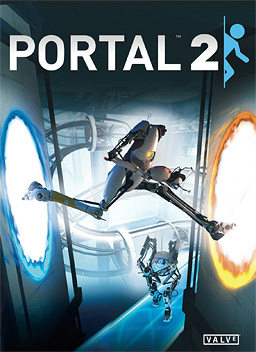
In a gaming world where most of the action titles seem to be taking the “increased difficulty = more monsters and more shooting”, finding a title that is engrossing, has a good narrative and doesn’t rely on ultra-violence is quite difficult. I haven’t bought a new adult action game since Bioshock 2 — I’ve been buying things like Little Big Planet 2 and Rabbids titles instead. Compare Resistance: Fall of Man with its sequel, FEAR likewise — I haven’t gone near Dead Space 2 because the original took that to a frustrating extreme. There is only so much I can cope with button mashing through a fight only to run straight into another one with barely enough of a break to regain a couple of health bars.
Portal 2 is a breath of fresh air in a room stale with the scent of testosterone, cordite and spent shell casings.
It’s a puzzler, much like the first one. The first one, however, had us join Theseus after entering the Labyrinth then bug out as soon as the Minotaur was dead. In Portal 2 we get to see a bit more of Crete and the Kingdom of Minos.
Gameplay is similar to the first offering, although there is less reliance on laying portals in exactly the right place with impeccable timing and more on figuring out the correct sequence and making use of the portals to achieve the seemingly impossible. While I had a considerably frustrating time with the original, lacking the precise hand-eye co-ordination required to make accurate portals at high speed while flying through the air, I found Portal 2 to be just frustrating enough. I liked the logical progression of problem solving. Rather like doing a crossword, it’s necessary to gain an eye for it, to learn the rules and the patterns. There is a sense of accomplishment in gaining the mindset required to solve the puzzles. The achievement here isn’t being able to slaughter more and bigger and stronger rabid creatures: it’s being able to solve ever more complex puzzles that on first glance seem impossible until a solitary patch of white turns into the end of a thread that will lead you through to the exit.
There are nods to the original in the use of some of the same test chambers, run through the decay mill. If you are expecting the game to be as short as the original you are in for a shock at the point you think you have escaped into the outside world. The use of the derelict original facility to bring in a whole new set of puzzle types and give some background to the Aperture Science facility was enjoyable, seasoning the very dark storyline with welcome humour.
Another point for which Valve has my undying love is that our protagonist is a woman. But she just happens to be a woman. There is a point halfway through the game where GLaDOS says “She did all the work!” If you have been concentrating on the gameplay rather than laying out portals to get a look at your character, and know nothing of the game, this is the first time the sex of the character is clear. This isn’t Silent Hill, where being female inevitably leads to a plotline involving maternal instinct; or a reason for pneumatic busts à la Lara Croft; nor the ridiculous posturing of Bayonetta. Portal 2 passes the Bechdel test with flying colours, even when one of the women involved is a potato. (Spoilers!)
“Oh, it’s you. It’s been a long time. How have you been? I’ve been really busy being dead. You know… after you murdered me? Okay look, we both said a lot of things that you are going to regret. But I think we should put our differences behind us. For science. You monster.”
I couldn’t have been happier had a Big Daddy removed his helmet to reveal he was actually a Big Mummy.
We haven’t started on the co-operative level, and there are several achievements that I missed on my first run through, so there’s plenty of gameplay in it yet. If you fancy something a bit more cerebral than your standard first-person shooter, where difficulty isn’t measured in how many times you die in a sequence before you learn the spawn patterns and get your timing just right, I can thoroughly recommend this engaging and satisfying number from Valve.
I won’t spoil the ending, but yes, there is a song.
Sam reviews: The Minister of Chance
by ravenbait on Apr.10, 2011, under Reviews
![]() My last copy of Fortean Times carried a plug for something interesting, although if Frood hadn’t spotted it and waved it under my nose I would have missed it. Knowing that I’d developed a bit of a thing for Doctor Who of late, he pointed it out to me and I’m very glad he did.
My last copy of Fortean Times carried a plug for something interesting, although if Frood hadn’t spotted it and waved it under my nose I would have missed it. Knowing that I’d developed a bit of a thing for Doctor Who of late, he pointed it out to me and I’m very glad he did.
The Minister of Chance is a Doctor Who spinoff describing itself thusly:
The Minister of Chance is a new form of entertainment – a radiophonic drama – made using a combination of film and radio techniques and delivered by podcast. It is the first, but we hope not last, of its kind. By painstakingly constructing soundscapes we create worlds that you can drift into wherever you are.
The titular character was introduced in Death Comes to Time, which I haven’t heard but may now have to seek out for background (although I’m not sure I like the idea of Ace becoming a Time Lord). I do not think it is necessary to have heard that work to enjoy this, however.
The prologue, which is free on youtube, sets the scene: Paul McGann gives it some as Durian, a particularly nasty piece of work who straight away shows that politicians have no need to carry personal arms when they can offer plausible threats of much worse. It seems to be a straightforward sort of fantasy affair, with a bit of added science, but then this is just the teaser.
Episode 1 is available for download for the measly cost of £1.49, which is much less than a pint and much more worthwhile. In this we meet the rest of the main characters, and find ourselves in a beautifully realised world in which science is banned in favour of magic that doesn’t work. The scientists are labelled charlatans and frauds and outlawed, while a witch inhabits one of the primary positions of power. Even as you listen, thinking that their rockets don’t work by magic, their weapons don’t work by magic, asking yourself how can they say that science is a hoax, it is clear that those in charge are all too aware of this. Magic, then, is the opium they feed their people while denying them access to anything that would cause them to question.
Into this come Kitty, a feisty young girl of uncertain origins and unusual abilities, and an unnamed stranger who has a cold dispassion and no-nonsense attitude and who knows so much that his science looks like magic. He’s going to show her things that are as wonderful as they are unbelievable, she’s going to teach him that his brilliance runs the risk of him underestimating those around him, and you are along for the ride.
The Minister himself reminds me of an early Doctor, back when he was young enough to want to act old (I loved that explanation given by Tennant in the Comic Relief special for why the Doctor has been getting progressively younger). Kitty is a good, strong character who is full of confidence and knows how to handle herself. Jenny Agutter’s Professor Cantha is another strong female character, holding out for science in a world where doing so is decidedly dangerous.
The rest of the cast is seasoned with a who’s who of classic British science fiction. It’s almost as if they filled a bran tub with actors from Blake’s 7 and Doctor Who and pulled a few out at random. Having not seen anything from Paul Darrow since Hercules, I was delighted to hear him back in laconic action. Sylvester McCoy is another actor we’re more used to seeing in the role of the good guy.
The soundscapes are immersive. With no special effects to fall back on the writing carries everything, and it is more than up to the task. I am impressed by how clearly I was able to “see” what was happening and I am eagerly awaiting the release of the next episode.
The continued future of this series is dependent on getting the funding, and they more than deserve it. If you like science fiction and pine for the days when budgets were so low the writing had to make up for it, and did; if you want to support talented artists producing great work; even if you just want to hear Avon say a naughty word — head over there, click buy, and make sure to put your headphones on. You won’t be disappointed.
Sam reviews: Eden Log
by ravenbait on Apr.08, 2011, under movies, Reviews
![]() Some of you may remember (or not) that I had flu at the end of last year. Proper baby-eating Bishop of Bath and Wells flu. Well, said flu damaged my lungs a bit and so when I caught a cold last week it went straight to my chest and stayed there.
Some of you may remember (or not) that I had flu at the end of last year. Proper baby-eating Bishop of Bath and Wells flu. Well, said flu damaged my lungs a bit and so when I caught a cold last week it went straight to my chest and stayed there.
Seriously. My training is thoroughly jinxed this year.
However, there was a bright side. Just as I have a rule about taking a punt on music, I have a rule about taking a punt on DVDs, and a few months ago Amazon sent me one of their “You’ve shopped for these things and so we thought you’d like this” emails, in which the items on offer were cult science-fiction world cinema.
Yeah. Niche.
Anyway, one of the DVDs I picked up at that time, what with them all being less than a fiver, was an odd little number called Eden Log. Frood and I started watching it but it was quickly clear that it wasn’t Frood’s sort of thing so I put it away for a time when I could watch it myself. Being stuck at home ill was an ideal opportunity.
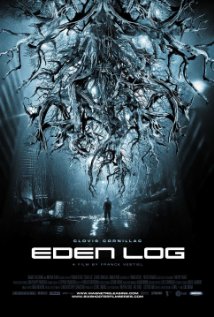 Eden Log is the 2007 directorial debut of Franck Vestiel. He also wrote the screenplay. If I had to summarise it, I’d say it was a cross between Pandorum and Silent Running with a bit of Logan’s Run thrown in for good measure. In reverse, if you can possibly imagine such a thing.
Eden Log is the 2007 directorial debut of Franck Vestiel. He also wrote the screenplay. If I had to summarise it, I’d say it was a cross between Pandorum and Silent Running with a bit of Logan’s Run thrown in for good measure. In reverse, if you can possibly imagine such a thing.
The film opens in the pitch black, and I mean pitch black. There is very little lighting and the lead character, impressively played by Clovis Cornillac and at this point nameless, is obviously freezing. The goosepimples on his arms look hard and prominent enough to grate ginger and the breath misting from his mouth has a realism that I don’t think could be achieved by CGI. Even his guttural grunts suggest the sort of forced vocalisation that anyone who has ever tried to exert physical effort while that bloody cold will remember all too clearly.
In what I think is a move that is either very brave or very French, the lighting remains intermittent, the colour scheme almost monochromatic, and the camera intimate for a considerable period while our protagonist finds his way to what appears to be an abandoned, dilapidated facility where he is greeted by an automatic message directed at newcomers. It talks of workers gaining citizenship by sacrifice and it is obvious, immediately, that there is some whitewashing going on here. It is pitched perfectly to alert the viewer to the desperation of the anonymous incomer: you know that whoever heard this for real would be so relieved to make it this far that he wouldn’t look for the small print.
As the film goes on it becomes clear that the “Eden” of the title is not achievable to those who approach from down here in the dark, and that, other than the ones running the place, those who derive the most benefit are kept in equal, if metaphorical, dark about what exactly is needed to sustain their quality of life, while those down below take mortal risks to provide it.
It is Yggrdrassil gone bad, a study in absurdo of what might happen if, in harnessing Nature, man should choose to use a martingale and the dregs of society as mulch.
Like many takes on this subject, including Hollywood budget-busters, as Man’s Disrespect for Mother Nature is a well-worn trail in storytelling, it over-simplifies and hand-waves the science and in places gets the science so wrong it becomes unintelligible. Couple this with the lack of exposition and reliance on metaphor and the film is, at times, horrendously confusing. But the performances of the two lead actors — the aforementioned Cornillac is particularly good, although Vimala Pons does as much as anyone could with the limited material available — are excellent and Vestiel’s determination to see what he started through to the end without mollycoddling his audience is admirable. I can’t even complain about the treatment of the female lead: there is one scene of rape that is so carefully done I could only quibble if I ignored the context entirely, and as this is a story entirely centred on Cornillac’s character I refuse to be upset about Pons getting less screen time. What she does get she puts to excellent use.
I confess I wasn’t entirely sure I’d grasped all of the story when it came to the end — like Valhalla Rising it left the viewer to come to his or her own conclusions about exactly how what happened actually happened. And, like Valhalla Rising, I looked it up afterwards because it was intriguing enough for me to want to know what other people had thought.
If you like your science fiction straightforward and your horror gory, leave this be. There’s no blasting off and nuking the place from orbit. There is no man vs monster. In this man is the monster, both figuratively and literally. There is scant dialogue and some viewers may find that there are sections where the use of hand-held cameras becomes a little nauseating, although it is not done for effect (it’s by far less irritating than it was in Cloverfield).
It’s not what I’d call a great film but it is an interesting one. The cast and crew cared about this, and it shows, despite the lack of resources available. It’s not as good as Moon but it’s many times better than most of the science-fiction films I have seen over the past few years. It’s a proper story, actually trying to say something, rather than a buffet of special effects and sexy actors pretending to kick ass in implausible scenarios.
Eden Log has the spirit of Aeon Flux the original series rather than Aeon Flux the movie.
Sam reviews: Ulladubulla Vol 2
by ravenbait on Feb.25, 2011, under music, Reviews
![]() Every so often I take a random punt on some obscure album, most frequently these days as a result of hearing something on a computer game.
Every so often I take a random punt on some obscure album, most frequently these days as a result of hearing something on a computer game.
It was Last.fm that spurred my most recent gamble.
Ulladubulla Vol 2 is a cash-in on Ulladubulla, itself apparently gestated within a PS1 game of which I have never heard.
I’m a big fan of the original musical War of the Worlds. When I was about 5 I couldn’t choose between that, Mike Oldfield’s Tubular Bells or Vangelis’s Spiral as my favouritest things ever (which might say a lot about me). I’m considerably older now, and have a bad trance/dance habit, because it makes the endless hours on the turbo more bearable. When last.fm pitched up the Dario G remix of Brave New World I thought “Hello!”
My take-a-punt limit is around 4 quid, and it works like this: I hear a track I like. I find the album on MP3 download (if it’s not downloadable all bets are off). If the number of tracks on the album I like sufficiently to buy individually is large enough that it would cost more than the album, I’ll take a punt, up to the limit of 4 quid.
In other words, when Ln > A ≤ 4, where L = liked track, n is an integer smaller the number of tracks on the album and A is album cost.
Ulladubulla sneaked in on the boundary at £3.89, with 4 tracks I was sure I liked, one I thought I liked, and 17 tracks on the album.
I tweeted my initial review in realtime, and it went like this:
• Took the 4 quid punt. Papa Ootzie’s opener is creepy in a Stranglers, Men In Black gone really dark kind of way.
• Zube’s Horsell Common & the Heat Ray is Will Smith meets Ghost Dog. Initially I flinched but it might be a grower.
• Oooh. Tom Middleton’s Cosmos re-edit of the Eve of the War has some fat reverb reminiscent of Pendulum’s grabbier stuff. Like.
• N-Trance turns Forever Autumn into a dance track. Not as bad as I feared. Wouldn’t be out of place on a chillout mix.
• Onto Max Mondo’s The Artilleryman and the Fighting Machine. Unconvinced. Needs more effort 2/5.
• There are weird noises in the background that make me think Shaggy is going Bombastic on a Martian. Um. Niche.
• Stephen Murphy’s light-handed approach to the Red Weed is interesting. Layers whimsy over the creeping horror.
• Todd Terry vs David Essex. Wangst turns chirpy cockney. Who’d’ve thunk?
• OMG. WTF has Max Mondo done to Julie Covington? KILL IT WITH FIRE!
• That was the first track I was forced to skip because it was just too awful.
• Hybrid’s remix of The Eve of the War is the sort of track you’d find on WipeOut HD. Before you replaced the soundtrack.
• Stephen Murphy’s Dead London is what happened when Jamie took his magic torch into the 28 Days Later universe.
• Sticking an Alan Parsons-esque piano/drum riff on a track doesn’t make it a remix. The Spirit of Man (Spirit of Dub) gets 1/5.
• Dario G’s Brave New World. Am liking it already. Take THAT traffic queue! I am fixie ninja! Choke on my l33t filtering skillz!
• Ben Liebrand’s remix of the Eve of the War is making me giggle. I don’t think that was the intended reaction.
• OK. Max Mondo’s Horsell Common and the Heat Ray is what got me started on this, so it can’t be that bad.
• And oddly, it’s just meh. Of all the tracks so far it doesn’t really stand out in anyway, good or bad.
• DJ Keltech’s take on same song reminiscent of the final levels of Rez. Multiple layers of implied architecture
• Zube assaults the Spirit of Man and leaves it beaten, broken, bleeding, humiliated and suffering from PTSD in a corner.
• Ulladubulla vol 2: worth the 4 quid, but only because it would have cost 40p less to buy the 4 best tracks (out of 17) individually.
Having listened to the album a few times since then, I’d largely stick with the above (particularly the kill it with fire comment), with a couple of additions.
Although Zube’s take on Horsell Common isn’t as bad as it first sounds, when you are stuck on the turbo in desperate need of distraction you start listening to lyrics. Maybe the effort was doing something weird to my brain but the lyrics to that particular track seem to be particularly offensive, advocating a degree of cultural and xenophobic paranoia so intense I am amazed the Jeff Wayne estate was willing to allow his name to be associated with it. I could be convinced I were imagining it were it not for the fact that (a) I’m not; and (b) the lyrics of Zube’s Spirit of Man remix convey some equally dubious sentiments.
On the other hand, I am more enamoured of Papa Ootzie’s opener, the Eve of the War, which takes a look at the situation from the Martian POV and would make a nice little flash piece:
The problem is, of course, the humans.
Mars is incapable of sustaining life: our efforts to sustain the biosphere are exhausted. The water table and temperature decrease annually, as does our population. The only consequential course of action is the conquest and occupation of Earth, our young Sun-neighbour. The means and methods for this attack are already being realised. A large scale hydrogen accelerator will be constructed. This will launch suspension pods carrying the assault forces…
Unlike some other reviewers, I’m not certain that it is fundamentally wrong to update the original musical with rap and dance tracks. Taking stories and transposing them to a contemporary setting is done frequently enough: why not musicals? I’m less convinced (to put it mildly) by Zube’s attempt to shoehorn an attack by Martians into a rant about the rise of Islamic fundamentalism, and his take on the Spirit of Man, which seems to be a Daily Wail-inspired rant about peedoes and immigrunts rather than a celebration of human perseverance and determination.
I’m not disappointed in the album, particularly, but I wouldn’t recommend it unless you have a taste for mash-ups that shouldn’t work but sort of do and four quid burning a hole in your pocket. If I were a sackperson with her very own poppit and a retry button, I would not buy it again.
Sam reviews: Witching Hour
by ravenbait on Feb.13, 2011, under music, Reviews
![]() Ever since BMX XXX I have paid particular attention to the music used in video games. I’ve got a lot of material in my collection that wouldn’t be there without a combination of video games and the likes of Pandora (I’m currently using Last.fm for the same purpose because UK users have been blocked from Pandora).
Ever since BMX XXX I have paid particular attention to the music used in video games. I’ve got a lot of material in my collection that wouldn’t be there without a combination of video games and the likes of Pandora (I’m currently using Last.fm for the same purpose because UK users have been blocked from Pandora).
As you’ll have noticed, recently I’ve been spending a lot of time on Little Big Planet, and the playlist for LBP2 is excellent. My favourite, by far, is Ladytron’s Ghosts, to be found in the Death By Shockolate level:
Every so often a track has a shape that does something for me that I really need, for whatever reason, at that particular point in time. In the past I’ve developed obsessions over Massive Attack’s Angel, Pass the Hatchet by Yo La Tengo, Yeasayer’s Ambling Alp and many others, from Vivaldi to the Dandy Warhols via Murray Gold. Right now the track that’s doing it for me is Ladytron’s Ghosts.
So much did I like this track that I bought one of their albums, Witching Hour. I was blown away. It is rare that I buy an album and have to comment to Frood that it is just brilliant.
Ladytron’s sound is somewhere on a spectrum that includes Goldfrapp, the Sisters of Mercy, Gary Numan, Depeche Mode, Cibo Matto, the Cult, Jefferson Airplane and Shakespears Sister. The band comprises Liverpool producer and DJ Daniel Hunt, Reuben Wu and singers Glaswegian Helen Marnie and Bulgarian-born Israeli Mira Aroyo.
The two women have vocal styles that both complement and counterpoint one another, with Marnie’s soft but assertive lead underpinned by Aroyo’s more spoken style. The soft-rock electronica ranges from harsh, dark reverb (Soft Power) to the sort of gothic effervescence that belongs running across rooftops with a heavily made-up Brandon Lee (High Rise), with a couple of whimsical diversions (eg Cymk) for light relief. This is certainly not an album you could describe as homogenous. High Rise is a stonking opener while Fighting In Built Up Areas stands out for its relentless pounding and Aroyo taking the lead in Bulgarian, lending interesting architecture from the vocalised sibilants. One of my favourite tracks is Last Man Standing, which has the same shape as bluebells in a sudden downpour on an otherwise sunny day.
It is very rare for me to come across a band I like this much instantly. I expect I shall be acquiring the rest of their discography in due course.
And thank you, Media Molecule, for introducing me. Take note, music moguls: rather than charging a fortune for the rights to use tracks in video games, you should be considering just how many sales will result from people wanting to buy the music.
Misfits of Science
by ravenbait on Feb.11, 2011, under Reviews, television
![]() Outcasts is the BBC’s new flagship science fiction drama for the adult audience (I am assuming that Doctor Who remains the flag-bearer for science fiction in general). It follows the various stories of a group of people who are settlers on the planet Carpathia, after some so-far unspecified calamity on Earth made it necessary to evacuate. At the time the series starts the main characters have been there for ten years and the only known surviving transport ship is about to try to land on the surface, bringing with it the last influx of fresh blood the settlers are ever going to see. After this, they are on their own.
Outcasts is the BBC’s new flagship science fiction drama for the adult audience (I am assuming that Doctor Who remains the flag-bearer for science fiction in general). It follows the various stories of a group of people who are settlers on the planet Carpathia, after some so-far unspecified calamity on Earth made it necessary to evacuate. At the time the series starts the main characters have been there for ten years and the only known surviving transport ship is about to try to land on the surface, bringing with it the last influx of fresh blood the settlers are ever going to see. After this, they are on their own.
Carpathia is an Earth-like planet, named after the ship that came to the rescue after the Titanic disaster. No attempt has been made to make the setting seem alien, other than something called a “white-out”, in which presumably tidal forces from the planet’s moon cause what would appear to be a dust storm on steroids. They say it’s something to do with the moon, anyway. In the two episodes so far we have had bad science (aforementioned white-outs and something called deep brain visualisation, in which the subject sits in a special chair and his memories can be seen on the big screen) and good science (an excellent scene in which the teacher was describing the Goldilocks Zone to a class of children). It is therefore not what I would call hard science fiction, as it is the sort of science fiction I can demolish with two diagrams and a joke. A lack of hard science isn’t necessarily a negative criticism, I like soft science fiction as much (and occasionally more than) the next person. However I dislike science fiction that presents itself as hard and then widdles all over itself with hand-waving and dodgy research, not to mention something I saw done in Until the End of the World.
As far as main characters go, I was delighted to see very strong females in the early sections of the first episode. One of the reasons I like science fiction so much is that it has a track record of strong female characters. One of my earliest introductions to strong women was Dayna from Blake’s 7 — an assertive, competent, highly-skilled warrior who took no nonsense from anyone (and whose attractiveness usually took a back seat to the fact that she kicked arse).
Stella Isen, played with usual competency by Hermione Norris, is the Head of Security. Fleur Morgan (Amy Manson) is one of her officers. Both started out well, but Stella’s role quickly became that of the obsessed mother, while Fleur’s maternal instincts were also called upon before the first episode was halfway done when her best friend’s husband went a bit nuts, beat his police officer wife mostly to death, then took off into the wilderness with his son.
At which point my face did this:
So we’ve passed the Bechdel test early and now we’re going to ignore the whole bucking of the gender-bias trend and relax into the girls like babies and boys like guns model. I see.
By episode two the writer, Ben Richards, has made his premise for the series not only perfectly clear by way of storytelling, but also explicit in the dialogue: can humans truly live together in peace? Outcasts is a social pressure-cooker: the problem with it isn’t that this is a bad idea, but that Richards has come to it with the answer already and has arranged everything so that the story can’t fail to produce that answer.
The divisions of labour between the various sub-groups are artificial, counter-productive, and I can’t for the life of me imagine any settlement group on a distant planet trying to work that way. The method of introduction for the various plot points feels like shoehorning them in to serve the underlying premise, rather than things that might have happened and the consequences that ensued. While I enjoy the fact that there is little in the way of unnecessary exposition, I cannot get past the idea that the structure of the society there is implausible and thus everything that happens is difficult to believe on principle.
This is, in short, one of my pet hates: plot driving character, and in this case it extends to the very nature of the community. The desired conflict will not happen without imposing certain conflicts that come across as terribly unlikely with a few moments of thought about how people would actually behave in such an environment.
It is drama. That it takes place on a different planet is simply a device. Even the use of genetic modification is there to define an us-and-them conflict. They could have done the same by punting the characters a couple of hundred years back in time, sticking them somewhere remote and picking some arbitrary differentiation.
So, yes. The only thing that defines this as science fiction is that there are women doing what is usually thought of as a man’s job. It amuses me immensely that writers still find the inclusion of women who are taking on roles traditionally performed by men to be an easy way of saying “LOOK. THIS AM BE THE FYOOOOOTYOOOOOR! IN SPACE!”
But it’s also somewhat tragic.
What about LBP2, RB?
by ravenbait on Feb.03, 2011, under games, gaming, Geekery, Reviews
![]() Is Little Big Planet 2 everything you expected? Have you been disappointed since getting your sticky, eager little paws on it? You have been terribly quiet about it and we thought maybe you were so heartbroken that you had consigned it to the oblivion of a mental oubliette, along with Highlander 2, Wolverine: Origins, X-Men 3: X-Men United and X-Men: the official game.
Is Little Big Planet 2 everything you expected? Have you been disappointed since getting your sticky, eager little paws on it? You have been terribly quiet about it and we thought maybe you were so heartbroken that you had consigned it to the oblivion of a mental oubliette, along with Highlander 2, Wolverine: Origins, X-Men 3: X-Men United and X-Men: the official game.
Can’t stop
to talk.
Too busy
playing
with
SACKPEOPLES!
And sackbots! And grabinators! And robobuns! And caterpillars! And grappleguns!
It’s as awesome as an awesome thing
That has as a hobby
Being Made of Win
And Rocking like a Ninja
Who is also God and King!

